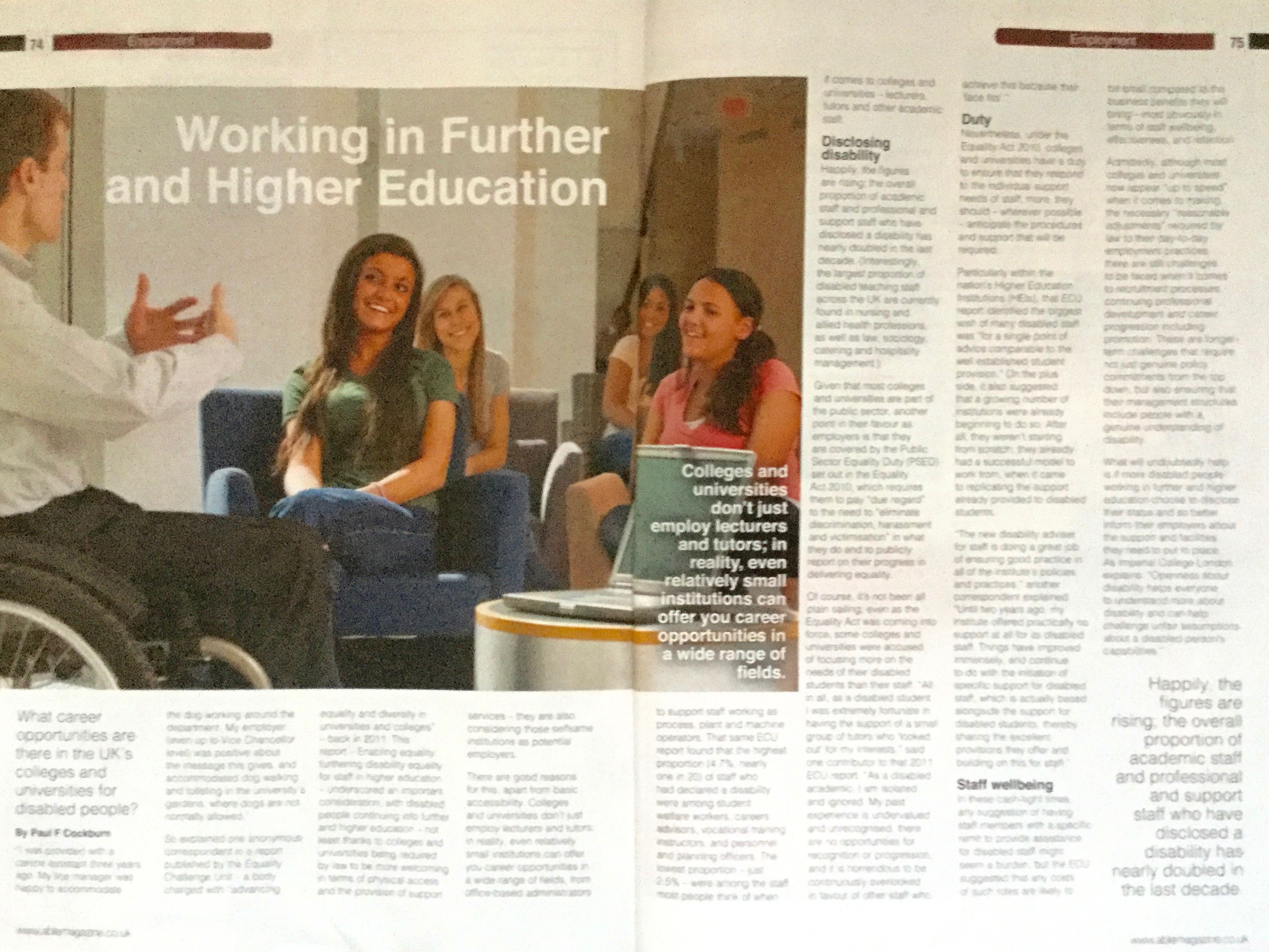
“I was provided with a canine assistant three years ago. My line manager was happy to accommodate the dog working around the department. My employer (even up to Vice Chancellor level) was positive about the message this gives, and accommodated dog walking and toileting in the university’s gardens, where dogs are not normally allowed.”
So explained one anonymous correspondent in a report published by the Equality Challenge Unit – a body charged with “advancing equality and diversity in universities and colleges” – back in 2011. This report – Enabling equality: furthering disability equality for staff in higher education – underscored an important consideration; with disabled people continuing into further and higher education – not least thanks to colleges and universities being required by law to be more welcoming in terms of physical access and the provision of support services – they are also considering those selfsame institutions as potential employers.
There are good reasons for this, apart from basic accesibility. Colleges and universities don’t just employ lecturers and tutors; in reality, even relatively small institutions can offer you career opportunities in a wide range of fields, from office-based administrators to support staff working as process, plant and machine operators. That same ECU report found that the highest proportion (4.7%, nearly one in 20) of staff who had declared a disability were among student welfare workers, careers advisors, vocational training instructors, and personnel and planning officers. The lowest proportion – just 2.5% – were among the staff most people think of when it comes to colleges and universities – lecturers, tutors and other academic staff.
Happily, the figures are rising; the overall proportion of academic staff and professional and support staff who have disclosed a disability has nearly doubled in the last decade. (Interestingly, the largest proportion of disabled teaching staff across the UK are currently found in nursing and allied health professions, as well as law, sociology, catering and hospitality management.)
Given that most colleges and universities are part of the public sector, another point in their favour as employers is that they are covered by the Public Sector Equality Duty (PSED) set out in the Equality Act 2010, which requires them to pay “due regard” to the need to “eliminate discrimination, harassment and victimisation” in what they do and to publicly report on their progress in delivering equality.
Of course, it’s not been all plain sailing; even as the Equality Act was coming into force, some colleges and universities were accused of focusing more on the needs of their disabled students than their staff. “All in all, as a disabled student I was extremely fortunate in having the support of a small group of tutors who ‘looked out’ for my interests,” said one contributor to that 2011 ECU report. “As a disabled academic, I am isolated and ignored. My past experience is undervalued and unrecognised, there are no opportunities for recognition or progression, and it is horrendous to be continuously overlooked in favour of other staff who achieve this because their ‘face fits’.”
Nevertheless, under the Equality Act 2010, colleges and universities have a duty to ensure that they respond to the individual support needs of staff; more, they should – wherever possible – anticipate the procedures and support that will be required.
Particularly within the nation’s Higher Education Institutions (HEIs), that ECU report identified the biggest wish of many disabled staff was “for a single point of advice comparable to the well established student provision.” On the plus side, it also suggested than a growing number of institutions were already beginning to do so. After all, they weren’t starting from scratch; they already had a successful model to work from, when it came to replicating the support already provided to disabled students.
“The new disability adviser for staff is doing a great job of ensuring good practice in all of the institute’s policies and practices,” another correspondent explained. “Until two years ago, my institute offered practically no support at all for its disabled staff. Things have improved immensely, and continue to do with the initiation of specific support for disabled staff, which is actually based alongside the support for disabled students, thereby sharing the excellent provisions they offer and building on this for staff.”
In these cash-tight times, any suggestion of having staff members with a specific remit to provide assistance for disabled staff might seem a burden, but the ECU suggested that any costs of such roles are likely to be small compared to the business benefits they will bring – most obviously in terms of staff well-being, effectiveness, and retention.
Admittedly, although most colleges and universities now appear “up to speed” when it comes to making the necessary “reasonable adjustments” required by law to their day-to-day employment practices, there are still challenges to be faces when it comes to recruitment processes, continuing professional development and career progression including promotion. These are longer-term challenges, that require not just genuine policy commitments from the top down, but also ensuring that their management structures include people with a genuine understanding of disability.
What will undoubtedly help is if more disabled people working in further and higher education choose to disclose their status and so better inform their employers about the support and facilities they need to put in place. As Imperial College London explains: “Openness about disability helps everyone to understand more about disability and can help challenge unfair assumptions about a disabled person’s capabilities.”
First published in Able Magazine, January/February 2016.